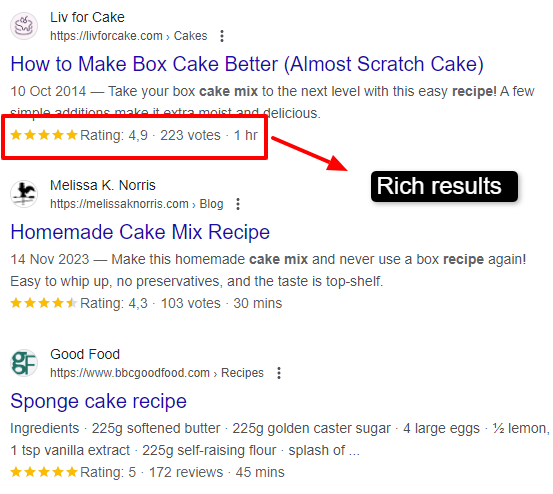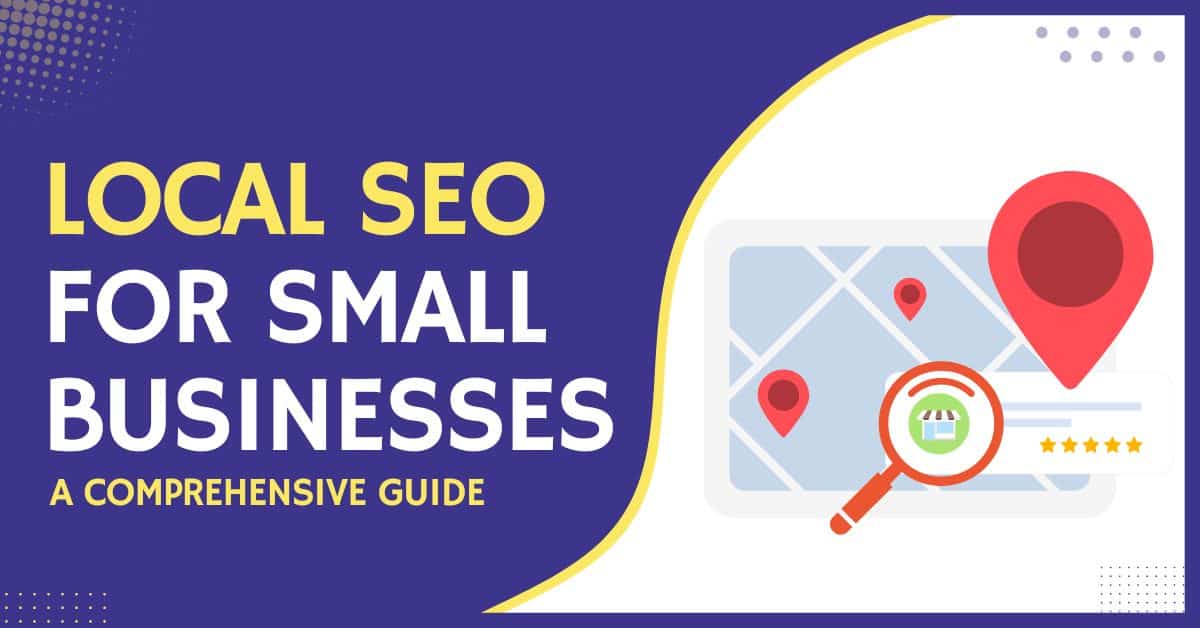Last Updated on 3 weeks by Rabin Rasaili
If you’re a small business owner, you know how important it is to have a strong online presence. But with so much competition out there, it can be hard to stand out from the crowd.
That’s where Local SEO comes in.
In this article, we’ll take a closer look at what local SEO is, the importance of local SEO for small businesses, and how you can improve your local search rankings.
By the end, you’ll have a clear understanding of what it takes to outrank your competitors and dominate your local market.
So let’s get started!
What Is Local SEO?
Local SEO is a marketing strategy to improve a business’s visibility in local search results including Google Maps. Here you are making sure you appear at the top when people nearby look for products or services you offer.
It mostly involves optimizing your Google Business Profile, getting listed in local directories, managing online reviews, and creating location-specific content.
Local SEO is more critical for brick-and-mortar businesses to drive foot traffic to their stores but other service businesses can also use it to increase their local visibility.
Differences between Local SEO and SEO
The main difference between Local SEO and SEO is the geographical focus:
Local SEO specifically targets customers in a particular area, city, or region. It emphasizes location-based keywords, Google Business Profile optimization, and local citations to appear in local search results and Google Maps.
SEO, on the other hand, aims to improve a website’s visibility in global search results, targeting a broad audience regardless of location. It focuses on general keywords and topics relevant to the business or industry.
Why Local SEO Matters for Small Businesses
Nearly half(46%) of all Google searches have local intent. It shows how huge the local market is.
For small business owners, Local SEO offers an excellent opportunity to tap into this huge market and bring more leads and sales to their business. Especially for businesses with a physical location that depends on foot traffic.
In addition, people often use mobile to search for local businesses online. “Near me‘, searches on mobile have increased by 500%+ in the last two years. The interesting thing is “near me” queries are one of the most popular searches for voice assistants.
Most importantly, people have a stronger intent of buying for local searches. For small physical businesses like restaurants, coffee shops, or retail stores, it can be a great way to bring foot traffic. These are the people more likely to convert and be your customers.

Source: Google
In simple words, Local SEO greatly matters for smaller businesses because it allows them to target potential customers in their specific geographic area. This can lead to higher foot traffic, increased phone inquiries, and ultimately more sales.
Benefits of Local SEO for Small Businesses
1. Increased Local Visibility: Local SEO helps small businesses rank higher in location-based search results, making it easier for nearby customers to find them online when searching for relevant products or services in their area.
2. Bring Foot Traffic: For businesses with a physical location, local SEO helps drive foot traffic to their store. These visitors have a higher intent to make a purchase or use a service, as they’ve already shown interest by searching for relevant local options.
3. Competitive Advantage: Local SEO helps small businesses compete better in their area. By focusing on local keywords, you can appear higher in local search results. This means more people in the neighborhood see the small business first when searching online. As a result, these local shops can attract more nearby customers, even if they’re not as big or well-known as national chains.
4. Cost-Effectiveness: Compared to other marketing methods, local SEO is less expensive and often more effective for small businesses targeting customers in their area. This approach allows them to compete with larger companies without spending a lot of money on advertising.
5. Improved Customer Trust: A strong local online presence builds trust. When potential customers see your accurate business information, positive reviews, and consistent details across the web, they’re more likely to choose and trust your business.
6. Better Conversion Rates and Long-Lasting Impact: Local SEO not only drives targeted traffic but also improves conversion rates, as customers searching locally are often closer to the purchase decision. Additionally, the effects of local SEO can have a long-lasting impact on a small business’s online visibility and customer acquisition.
Local SEO Strategies for Small Businesses
Here are some effective local SEO strategies that can help you improve your local search rankings and attract more customers.
1. Claim and Optimize Your Google My Business Listing
Google Business Profile is the one thing you don’t want to ignore if you want to show up in the local map pack.
Start by claiming your business profile on Google, which is free. Then, fill out all the information completely and accurately. This includes essential details like your business name, address, phone number, website, hours, and services, and enhance it with high-quality photos showcasing your business, products, or team.
A well-optimized GMB profile not only makes it easy for potential customers to find and contact you but also establishes your legitimacy and builds trust. This way people are more likely to engage with your business and become your customers.
2. Local Keyword Research
Keyword research is an essential aspect of any SEO strategy. For local SEO, it’s important to focus on keywords that are relevant to your business and location.
Identify the keywords and phrases that potential customers in your area are using to search for products or services like yours. These keywords should include geo-modified terms, such as the name of your city, neighborhood, or surrounding areas.
For example:
- “Best pizza restaurant in [your city]”
- “Plumbing services near me”
- “Top-rated hair salon [your neighborhood]”
- “Landscaping company [surrounding areas]”
- “Affordable car repair [your city]”
Additionally, analyzing your competitors’ website content and online listings can provide insights into the keywords they’re targeting.
3. Create Locally-Optimized Content
Once you’ve identified your local keywords, incorporate them into your website’s content, including pages, blog posts, and metadata (titles, descriptions, and headers).
Create location-specific content that addresses the needs and interests of your local audience, such as neighborhood guides, local event coverage, or area-specific tips and advice.
Optimize your content for both users and search engines by ensuring it is informative, engaging, and easy to read. Use your local keywords naturally throughout your content, but avoid keyword stuffing.
4. Ensure your website is mobile-friendly
Mobile searchers often have local intent, looking for nearby businesses, so a mobile-optimized site is a must to cater to their needs.
Additionally, Google has shifted to mobile-first indexing, meaning the mobile version of your site is used for ranking. A non-mobile-friendly site can lead to poor user experience, high bounce rates, and lower rankings.
This includes ensuring responsive design, fast loading times, easy-to-read text, clickable buttons, and simplified navigation for smaller screens.
5. Build Local Citations and Directory Listings
Local citations are online references to your business’s name, address, and phone number (NAP) on directories, review sites, and other online platforms. Search engines like Google use these citations as a way to verify the legitimacy and relevance of your business.
Additionally, claim and optimize your business listings on popular directories like Yelp, Yellow Pages, and industry-specific directories. It helps you establish a consistent and authoritative online presence for your business.
Related: How to Build Local Citations: 7 Proven Strategies for 2024
6. Maintain NAP consistency
NAP stands for Name, Address, and Phone number of your business. It is very crucial to make sure that your NAP details are consistent and accurate across different reputable sources.
This includes your website, Google Business Profile, social media accounts, online directories, and any other place where your business information appears on the internet.
Why it’s important:
- Build trust with search engines and users
- Prevents confusion for potential customers trying to find or contact your business.
- NAP consistency is a key factor in local search algorithms.
- Helps in creating quality citations.
Inconsistencies in NAP can confuse search engines and negatively impact your local SEO efforts.
Related: Importance of NAP Consistency in Local SEO: A Clear Guide
7. Encourage and Respond to Online Reviews
Online reviews are an important ranking factor in local search rankings. Encourage your customers to leave reviews on your GMB listing as well as other popular review platforms like Yelp, Facebook, and industry-specific sites.
But don’t run after positive reviews only. According to Google, people are more likely to trust a business that has both positive and negative reviews.
Respond promptly and professionally to both positive and negative reviews, addressing any concerns raised by customers.
Positive reviews can boost your local search rankings, while negative reviews, when handled appropriately, can demonstrate your commitment to customer satisfaction.
8. Implement Local Link-Building Tactics
Link building is an important aspect of any SEO strategy. For local businesses, you don’t need that many backlinks. Only a few will be enough to boost your site. However, it’s important to focus on the quality and relevancy of backlinks.
Participate in community initiatives, engage in charitable activities, or if possible sponsor local events, as these can often lead to high-quality local backlinks from reputable sources.
Additionally, seek out opportunities for guest blogging or contributing expert articles to local publications or industry-specific websites.
9. Leverage Social Media for Local Visibility
Social media platforms like Facebook, Instagram, and Twitter offer excellent opportunities for small businesses to connect with their local audience and increase their online visibility.
Create and maintain active social media profiles for your business, sharing relevant content, promotions, and updates.
Try to engage with your audience as much as you can. Interacts with them, responds to their comments and queries, and maintains a good relationship with them.
Finally, encourage your customers to follow, like, and share your social media content, as increased engagement can positively impact your local search rankings.
10. Optimize for Voice Search and Virtual Assistants
With the rise of voice-enabled devices like Amazon’s Alexa and Google Home, optimizing for voice search has become increasingly important for local businesses.

Source: Upcity
Voice searches tend to be more conversational and location-specific, often using phrases like “near me” or “in [city].”
Incorporate long-tail keywords and natural language into your website content, and ensure that your business information is accurate and up-to-date across all online platforms.
Additionally, consider creating content specifically tailored for voice search, such as FAQ pages or step-by-step tutorials.
11. Add Schema markup
Schema markup is a standardized way of providing additional information about your website’s content to search engines. It helps search engines better understand the context and relevance of your content.
For local businesses, implementing structured data for key elements like your business name, address, phone number, operating hours, and customer reviews can significantly improve your chances of appearing in rich search results, such as the local pack or knowledge panel.

Here’s what it does in simple terms:
- It tells search engines exactly what your business is, where it’s located, what services you offer, your opening hours, and other key details.
- This helps search engines show more accurate and detailed information about your business in search results.
- It can make your listing stand out with things like star ratings, which can attract more clicks.
- It can help you appear in more relevant local searches, potentially bringing more local customers to your website or store.
What are some common local SEO mistakes small businesses should avoid?
Some common local SEO mistakes small businesses should avoid include:
- Inconsistencies in your business name, address, or phone number can confuse search engines and negatively impact your local rankings.
- Neglecting to claim and optimize their Google My Business listing, which is a critical tool for local search visibility.
- Focusing on vague keywords rather than specific, geo-based keywords can make it harder for local businesses to rank in relevant searches
- Neglecting to build relationships with other local businesses and organizations
- Failing to respond to reviews and ignoring reputation management can impact customer trust and online visibility.
- Failing to prioritize mobile optimization can lead to a poor user experience and lower search rankings.
- Improper Use of Location Pages–duplicating content across pages or creating fake locations can be seen as an attempt to manipulate search rankings and result in penalties.
Conclusion
To conclude, Local SEO for small businesses might seem like a lot, but breaking it down into manageable steps makes it totally doable. In fact, it can potentially transform your small business from a hidden gem into a community cornerstone.
As you implement these strategies, keep in mind the importance of consistency, relevance, and user experience.
Remember, each step you take towards enhancing your online presence brings you closer to connecting with the customers who matter most.
After all, it’s all about making it easier for local customers to find and love your business. Give it a shot and see how it can make a difference!
Frequently Asked Questions

Rabin is an enthusiastic SEO and a content creator who is also a BCA graduate. He shares easy-to-follow hacks and tips to help you make smart choices for SEO tools and strategies through his blog. Passionate about learning and sharing, Rabin’s goal is to help you navigate your SEO and blogging journey with confidence.
